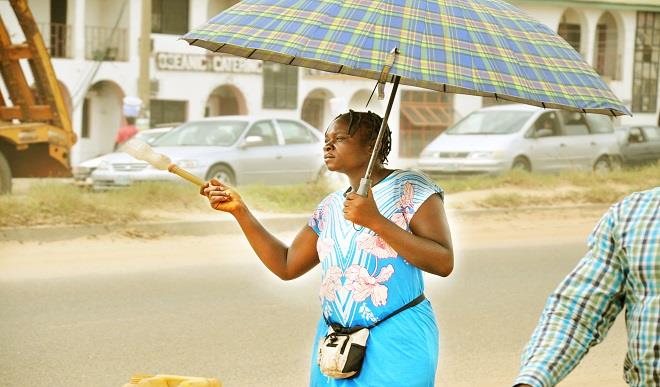
Kwasido Abah started a new business last week-and has a new routine: bathe, feed and hustle her children off to school. An hour later, she’s by the roadside Abuja-Keffi expressway, selling black market petrol.
“Why do I do it? I just don’t like it, it is risky. But what do I do? There’s no work,” Abah says. Before now, she ran a tuck shop in front of her home, but it wasn’t bringing enough income to sustain her family.
She is among a growing horde of women increasingly becoming involved in black market petrol. Their presence on the roadside is a growing phenomenon, and they are gradually outnumbering men.
Black market petrol is not a male-oriented business. But running after moving cars with a gallon of petrol dangling on one arm seems a work able-bodied young people would do.
Not anymore. Women don’t have to chase after cars. Cars come to them day and night, begging for a litre or two of petrol just to continue the ride home.
Abah is among dozens of women, with dozens of jerrycans under each arm, milling around the back of a filling station. They don’t have to wait on queues with other motorists. By special arrangement, petrol attendants sell hundreds of litres to their black market dealers in exchange for a settlement. Only after that can attendants see to the long queue of fuel-less cars waiting for a refill.
Drivers hurrying somewhere are torn between spending hours on queues that sometimes stretch for more than a kilometre within the city and stopping by Abah’s stand. They are uncertain if black market dealers adulterate their petrol with water or kerosene. In the end, they have no choice.
Black market dealers are a group motorists love to hate, or hate to love. But they fill a crucial gap in supply once fuel scarcity bites. Enterprising ones can supply any quantity of petrol you need-at double or triple the litre price. With pump price at regular stations doubling or tripling, black market prices aren’t such a big deal.
But the lives of the black market women are. Christy Mfon has gone through the cycle of job hunt cities as big as Abuja permit-and missed out being hired to sweep city roads and buildings.
“Since we don’t have anything doing, we have to struggle to help ourselves and our children,” Mfon says. “If [the authorities] don’t want us to sell fuel, let them create job opportunities for us, so we leave the market. Nobody likes suffering. We are suffering. There is no food, nothing. Even standing here is risky.”
Here is a roadside on only metres from Mararaba. It is 10pm, dark, and only Mfon and a new dealer are on the road. Each woman must approach each car slowing down and enquire how much petrol the driver can pay for.
But Mfon’s voice lifts in anger as she remembers how her husband lost his job nearly a decade back. “No settlement till today. He is at home, then they say we should not do black market to help ourselves, even to drink gari. It is well.”
It isn’t. Hours earlier, policemen had swooped on dealers in the area, confiscating their petrol and forcing others to pay up. Dealers have come to make routine choices daily: each must contribute N200 to “settle” police or face harassment and have their petrol seized, they say.
“Even when you buy petrol at a filling station and take the jerrycans out on a bike. They stop the bike and collect your fuel. If you follow them, give them bribe, they return it,” explains a dealer who refused to be named.
“We face challenges-from every corner. Running up and down in order to sustain a living. Police everywhere, they came today and packed all my fuel. At times they will ask us to donate N200 each, at times they will collect fuel,” narrates Mfon.
Rose James hasn’t gone through that hassle yet. She’s long traded in black market petrol, selling the product at her home. This night is the first time she’s trying to trade on the roadside.
“As fuel is scarce, we buy it costly. Even when we sell it at home, people don’t buy it. So I thought I should try on the road,” James says. It is close to 10pm, she’s seated before a 25-litre jerrycan and she’s sold only two litres.
“I don’t know whether I can sell this off tonight. I haven’t had the experience, since I started today.”
James may sell a litre for N200, but the income she expects will not help. Her husband hasn’t been paid in the last two months, she says. “And I have a small child who is ill. I had to force myself to leave home and come out here to manage things. We have children in school, we haven’t paid school fees, and there is the house rent too. For something to eat, you have to suffer. As a mother, it is not good for us to be standing on the roadside to sell black market.”
“In all of this, we just stick out our necks because the economy is bad. If I had good money to do business, I would rent a shop, stay with my children and take care of them.”
James isn’t sure when she will leave the roadside, but she wants to go home to her children. Abah knows when to go home: at 1pm, she begins packing up to pick her children from school by 2pm. She won’t be back on the roadside till the next morning, with whatever petrol is left unsold.

 Join Daily Trust WhatsApp Community For Quick Access To News and Happenings Around You.
Join Daily Trust WhatsApp Community For Quick Access To News and Happenings Around You.


